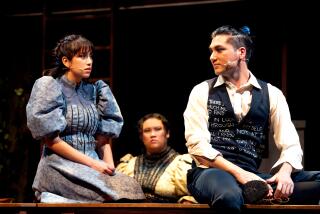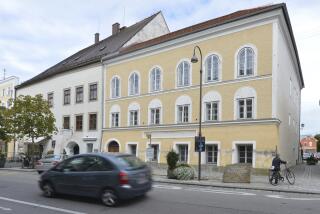Austria confronts Nazi past
- Share via
VIENNA — With dreamy, phantasmagorical scenes mixed with horrific depictions of torture, frequent nudity and “Heil Hitler” greetings, a new play unfolds about the clinic where Nazis killed children they deemed unworthy to live.
“Spiegelgrund,” a drama that opened Sunday on one of Vienna’s most storied stages, shows how far the country has come in confronting its dark past.
“Theater can’t change anything, but it has to tell the truth and be political,” playwright Christoph Klimke told the Associated Press.
Though Austria has come a long way in acknowledging its role collaborating with the Nazis in World War II, the play picks at a wound the country until recently preferred to leave untouched.
Some of the brains collected from the 700 children killed at the Am Spiegelgrund clinic because the Nazis deemed them to be physically, mentally or otherwise unfit to live were buried only in 2002. Dr. Heinrich Gross, a top Spiegelgrund doctor accused of involvement in many of the deaths, had a successful career after the war.
That such a play is being staged at Volkstheater, Vienna’s second-most prestigious theater, shows “how much the situation has changed,” said Wolfgang Neugebauer, a former scientific director at the Documentation Center of Austrian Resistance.
“In the ‘50s and ‘60s, no one would have thought of writing a play like this,” he said. “Now, even issues that are delicate in Austria, such as contemporary history and the Nazi era, are brought to stage.”
Art dealing with Nazi crimes is important because it could teach new audiences about the atrocities committed, he said.
The former clinic now serves as a memorial to the victims, and the play casts a glaring spotlight on the crimes committed at Spiegelgrund, where thousands of children were exposed to cruel experiments.
Gross, 89, began losing his standing in society only in the early 1980s, after he lost a libel suit he had filed against Dr. Werner Vogt, one of his critics. He remains free despite facing charges in the deaths of nine children. Austria’s justice minister has said that Gross will not be put on trial because he suffers from severe dementia.
Klimke finds that outrageous.
“The story goes on until today, and it’s a story about an Austria which does not want to remember,” the playwright said.
In the play, Rainer Frieb portrays Gross as an evil Nazi scientist who views his patients only as research objects. His bone-chilling laughter hangs omnipresent over the stage during the production, which shows children confined in straitjackets, held in tiny cage beds and force-fed medication through funnels.
Waltraud Haeupl, whose 4-year-old sister was killed at Spiegelgrund in 1942, said she found the depiction of the victims and their sufferings respectful.
More to Read
The biggest entertainment stories
Get our big stories about Hollywood, film, television, music, arts, culture and more right in your inbox as soon as they publish.
You may occasionally receive promotional content from the Los Angeles Times.










